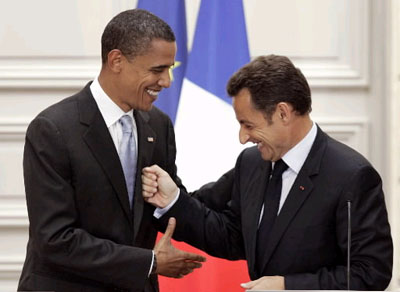
Nicolas Sarkozy, the French president, has rejected a plea from Barack Obama, the US president, for his country to send extra troops to Afghanistan.
Speaking at a news conference with Obama, in Strasbourg on Friday, Sarkozy gave his support to "the new American strategy in Afghanistan", but added there would be "no strengthening of French troops" in the country.
He said France was ready to do more in the field of police training and economic aid.
The two leaders addressed the media hours before the beginning of a Nato summit, which is likely to focus on Afghanistan.
’Stalwart ally’
Rob Reynolds, Al Jazeera’s correspondent reporting from Strasbourg, said it appeared Sarkozy and Obama "have agreed not to disagree over this".
"It does look as if the American side here is not going to push the issue ... because they recognise the political realities - it’s simply not going to happen," he said.
"America’s stature has been very materially diminished by the global economic crisis alone," he said.
"It’s a completely new situation for a US president in his dealing with his peers in Europe, and I think you’re seeing a little bit of a reflection of that in perhaps what is a little bit of a lower-impact presidency."
Despite Sarkozy’s unwillingness to commit more troops, Obama said he was "grateful" for Washington’s relationship with France.
"France has already been a stalwart ally when it comes to Afghanistan," he said.
Jaap de Hoop Scheffer, Nato’s secretary general, told Hamish Macdonald, Al Jazeera’s correspondent at the summit, that keeping member-states on the side of the military alliance’s operation in Afghanistan was crucial to its success.
"[Afghanistan] is a war amongst the people, which means that we as Nato must keep winning the hearts and minds of the Afghan people, and at the same time that we do not lose the hearts and minds of the nations who are providing the forces," he said.
Obama plan
Obama held talks with Angela Merkel, Germany’s chancellor, before the Nato summit opened in the German town of Baden-Baden.
The US president is expected to unveil more details of his plan to tackle a resurgent Taliban-led opposition in Afghanistan and Pakistan.
European nations have been reluctant to commit extra troops to Afghanistan in support of about 70,000, mostly Nato, soldiers stationed there.
"The United States has already said that it will deploy another 17,000 troops to the country, which was followed up by an announcement that another 4,000 US troops will be going there to train Afghan security forces," Hamish Macdonald, Al Jazeera’s correspondent, said from Strasbourg.
"What we will see over the coming days is the US lobbying very hard to see European allies send more troops as well. Whether or not they will do that is another question entirely."
Hillary Clinton, the US secretary of state, said on Friday that Obama will not push Nato members on the numbers of troops they can deploy, saying: "The Nato summit is not a pledging conference."
French return
Nato leaders will also formally admit France back into Nato’s military command structure, after a 43-year absence.
Marcin Zaborowski, a senior research fellow at the European Union Institute for Security Studies, told Al Jazeera: "The significance of France re-joining Nato is largely symbolic, rather than practical.
"There are two key issues that will come up in debate. The first is that France is going back to Nato to have more of a say in the decision-making process, the implications of which are being felt by France itself.
"Secondly, I think that the influence in the Nato stucture is not necessarily linked to the contibution to Afghanistan. What is really important for the US is that France is back in Nato. That sends a certain signal to other nations."
Croatia and Albania will also be formally welcomed into the Nato alliance at the summit.
Russian ties
The summit, which marks Nato’s 60th anniversary, will also examine the alliance’s relations with Russia, which deteriorated after Moscow’s war with Georgia in August.
The Russian government has repeatedly stressed its opposition to what it calls Nato’s attempts to gain influence in regions within Moscow’s traditional sphere of influence.
Both Georgia and Ukraine, which were members of the former Soviet Union, have in recent months signalled their intention to join the alliance.
Pavel Felgenhauer, a defence analyst and columnist for the Moscow-based Novaya Gazeta newspaper, told Al Jazeera that Russia may consider helping Nato in its mission in Afghanistan if the alliance refrains from expanding towards the Russian border.
"Russia does not like Nato much but it also does not like the Taliban in Afghanistan, which is Nato’s main enemy. Right now, Russia is ready to help Nato in Afghanistan but Nato will have to take into account certain interests [of Russia].
"There is a degree of tension and most of that is because of [the war in] Georgia. For Russia, Nato is not seen as a separate player but a continuation of Washington.
"Moscow does not want Nato to expand into the post-Soviet space and take on Georgia and Ukraine."
Source: Al Jazeera





















Stay In Touch
Follow us on social networks
Subscribe to weekly newsletter